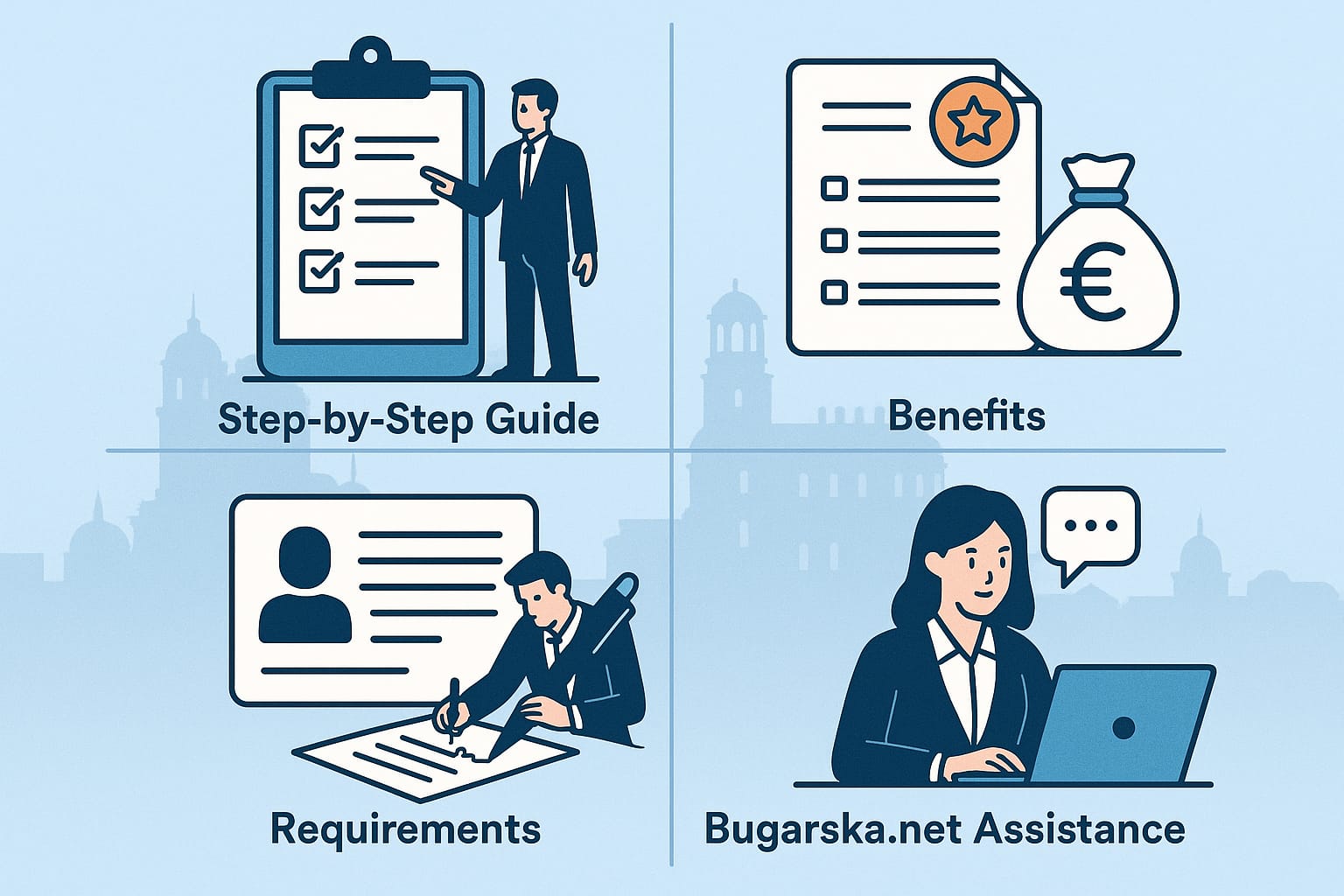Key Takeaways
- Bulgaria provides total EU market access with free movement of goods, services and capital. Register early for VAT if you anticipate turnover above BGN 100,000 a year and establish clear accounting in order to report to the EU.
- A flat 10% corporate income tax and extensive double taxation treaties encourage cost-effective global business. Be sure to plan your tax and filing calendar ahead so you pay on time, without penalties.
- Its position allows for fast trade across the EU, Balkans, and more via road, rail, and Black Sea ports. Select a city with good logistics connections like Sofia or Varna that correspond to your distribution requirements.
- Costs to operate are relatively low as well with low registration fees, office options and professional services. Utilize virtual offices and certified local accountants to manage overheads whilst maintaining compliance.
- Choose the appropriate structure for your aims by evaluating OOD versus AD criteria, management, and financing needs. Begin with an OOD for small to medium businesses with BGN 2 minimum capital, or an AD for bigger investments and listings.
- Journey a well-defined formation route that comprises, inter alia, obtaining a legal address, opening a capital escrow account, registering with the Commercial Register, and VAT acquisition where necessary. Bank compliance checks, legalized translations, and bilingual assistance – all things to expect and prepare for to avoid unnecessary delays.
Company formation in Bulgaria is the procedure of registering a legal entity with the Commercial Register to commence legal commercial activity. The most common form is the limited liability company, established as EOOD for a single owner or OOD for several owners, with a minimum capital of 2 BGN. Joint stock companies (AD) fit larger undertakings. Typical filings are articles of association, manager information, registered address and evidence of capital. Processing usually requires 1–5 business days upon submission. Main taxes – 10% corporate income, 5% dividend, 20% VAT – registration due above 100,000 BGN in 12 months. Foreign owners can form companies without local partners. The paragraphs below describe procedures, fees, periods and validity in Bulgaria now.
Why Form a Company in Bulgaria?
Bulgaria offers a great combination of EU market access, low taxes, and lean setup costs, making it ideal for startups and established firms looking to register a company in Bulgaria.
The EU Advantage
A Bulgarian company is right in the middle of the EU single market, so you have the free movement of goods, services and capital. Trading in the customs union seems natural and shipping stock across borders is easier and anticipated.
Additionally, when it comes to VAT, the registration procedure is streamlined. The one-stop schemes and standard EU reporting significantly reduce friction for businesses selling to clients in Germany, France, or Spain, thereby facilitating smoother operations for bulgarian companies.
Overall, incorporating a company in Bulgaria not only opens doors to the EU market but also simplifies cross-border trade, allowing entrepreneurs to navigate the complexities of international business with greater ease and confidence.
Favourable Tax Climate
Bulgaria offers a flat 10% corporate income tax, one of the lowest rates in the EU, alongside a 5% dividend tax, which is advantageous when distributing profits to owners. The presence of over 60 double taxation treaties helps reduce withholding taxes, making it beneficial for groups with business entities in the US, UK, or the Netherlands. The registration procedure for bulgarian company registration typically wraps up in just a few days, allowing entrepreneurs to invoice clients and open international bank accounts quickly. Additionally, low capital requirements mean that an OOD can start with as little as BGN 2 (approximately €1), freeing up cash for hiring or market experiments.
Strategic Location
Located in Sofia, Plovdiv or Varna, you find yourself at the crossroads of the Balkans with connections to Central Europe, Türkiye and the Caucasus. Road and rail corridors, Black Sea ports (Varna, Burgas) and modern air routes sustain regional distribution. Fast internet and robust data centers aid tech, fintech, and BPO crews establish near‑shore hubs that serve the EU in real time.
With neighbors like Greece, Romania, Serbia and North Macedonia, it facilitates regional rollouts and mixed EU/non‑EU supply chains.
Low Operational Costs
Low minimum share capital and small state fees keep startup costs down.
Office rent, co‑working and meeting rooms are inexpensive, with virtual offices available for lean teams.
Expert talent—engineers, finance and support—arrives at competitive salaries because of Bulgaria’s lower cost of living and robust education pipeline.
Accounting, payroll and compliance services are widely available at good rates, keeping you lean as you scale.
Choosing Your Business Structure
Your business structure, whether a limited company or joint stock company, affects how you operate, fundraise, and assume risk. Select according to size, capital requirements, decision authority, and liability comfort to prevent expensive modifications down the road.
| Form | Minimum capital | Liability | Governance | Advantages | Disadvantages | Key requirements |
| OOD (LLC) | BGN 2 | Limited to shares | Manager(s), Articles | Low capital, flexible, simple | Harder to raise large capital | Trade Register filing, Articles, manager appointment |
| AD (JSC) | BGN 50,000 | Limited to shares | Two-tier boards | Scales, easier investor entry | Higher cost, complex rules | Management & Supervisory Boards, prospectus if public |
| Branch | None (parent funds) | Parent liable | As per parent | Fast market entry | No separate legal shield | Register branch; parent docs |
| TRO | None | N/A (no trade) | Rep office | Market research presence | No revenue activities | Register with BCCI; limited scope |
| General Partnership | None | Unlimited, joint | Partners manage | Simple, high control | Personal asset risk | Partnership contract, registration |
| Limited Partnership | None | Mixed: general unlimited, limited capped | Defined by contract | Flexible roles | General partners exposed | Partnership contract, registration |
| Sole Proprietor | None | Unlimited | Single owner | Simple setup | Full personal liability | Trade Register, local rules |
The Limited Liability Company (OOD)
For small to mid-size firms an OOD is the default. Minimum capital is BGN 2 (around 1 euro), keeping entry costs low. Shareholders’ risk is limited to their investment in the company, protecting personal assets from business obligations.
You are required to name a minimum of one manager and establish internal regulations in the Articles of Association. The model was lean, so decisions remained fast and clear for one or a few owners.
With simple registration at the Commercial Register, foreign owners can operate from abroad. This suits businesses poking the market or using profits to fuel growth instead of raising outside capital.
Founders ought to tailor the OOD decision to their long term objectives. You can always switch to an AD later, but it’s time and money.
The Joint-Stock Company (AD)
An AD fits bigger ventures, institutional investors, or listings, making it an attractive option for those looking to register a company in Bulgaria. With a minimum capital requirement of BGN 50,000 (approx. 26,000 euro), shares can be registered or bearer, facilitating ownership transfer and larger fundraising efforts. Bulgarian law necessitates a Management Board and a Supervisory Board, which adds checks and investor comfort. While an OOD, an AD has advantages when it comes to access to capital markets, employee share plans, and private placements/public offers, it also comes with heavier establishment, audit, and disclosure obligations. The choice between OOD and AD ultimately depends on scale and funding channels.
Other Business Forms
A branch allows a foreign business to operate locally without a new legal entity, however, the parent company is liable. A trade representative office (TRO) conducts purely non-commercial activities such as marketing or research, handy for early working on a market. General and limited partnerships are joint ventures where partners desire shared management – general partners have unlimited liability. A sole proprietorship comes with the easiest admin, however you assume total personal risk as the owner. How much cash you require initially varies by the type you select.
Consider the Commercial Code forms with your appetite for risk, governance needs and timing in mind. Something you can maintain as you scale.
The Step-by-Step Formation Process
Validate the company name and core documents, then sequentially navigate the registration procedure and banking steps. Most Bulgarian company registration processes conclude within 2–7 business days, while the entire setup, including VAT and banking, usually takes around 3 weeks.
- Get a registered Bulgarian address for all filings and mail.
- Pay in the minimum share capital (min. BGN 2, ≈1 €) in a special escrow account.
- File application with Bulgarian Commercial Register, fees, and licenses if you do a regulated activity.
- Complete tax steps, including VAT, and operating bank account.
1. Prepare Your Documents
Prepare the Memorandum and Articles of Association, along with minutes of the constituent meeting of shareholders.
Collect manager documents: a notary-certified statement of consent and signature specimen, copies of IDs, and needed affidavits.
If shareholders sign abroad, notarize there and legalize/apostille, then translate in BG by a sworn translator.
Develop a checklist for signers, notarization points, apostilles, translations and deadlines so you don’t get rejected.
2. Secure a Legal Address
Select an actual Bulgarian address for the registered office and service of process. If you don’t need a desk, you can use virtual office services, which are cost-effective yet still legal. Remember the lease, a landlord consent letter if required, and evidence to lodge. If you move, file an address change with the Bulgarian commercial registry immediately to keep notices coming.
3. Open a Capital Account
Open a dedicated escrow capital account at a Bulgarian bank. Most banks can arrange this in roughly a day, with fees between BGN 10–30.
Deposit the capital and receive a bank certificate. The registry will request it. Bring IDs, corporate documents in draft form and address verification. Research bank fees and online banking solutions if you intend to make payments across borders often.
4. Register with the Commercial Registry
Send application, constitution, bank certificate, manager specimen and translations to Registry Agency.
Submit the fee and get the Certificate of Incorporation and Unique Identification Code (UIC), upon approval.
Plan on 2–7 business days – cross-border notarizations can add time. Seek sector licenses as required.
5. Obtain VAT Registration
Sign up if you’ll have more than BGN 100,000 turnover per year, or earlier if you want EU VAT privileges.
Register with the National Revenue Agency in practice it takes some 12 days, with a commitment typically within a week, so approximately two weeks all told.
Maintain clean accounting books and display your VAT number on all invoices and contracts.
Navigating Post-Registration Realities
Bulgaria post-registration work fires up quickly, connecting accounting, compliance, HR, and tax processes, ensuring that business owners maintain a clean record and avoid penalties throughout the year.
Annual Compliance
To maintain compliance, submit your yearly company tax return with the National Revenue Agency by 31 March for the previous calendar year. Following this, ensure you send in your annual accounts to the Bulgarian Commercial Register punctually, including directors’ minutes of approval if required. This step is crucial for bulgarian company registration and maintaining your business standing.
Next, verify and renew the sector permits and municipal licenses associated with your business activity, such as catering or transport. Some renewals may require clean tax certificates, so it’s wise to schedule a buffer for these processes to avoid delays.
Additionally, keep your company file current by noting changes in directors, managers, and capital in the Commercial Register. Managers typically send a good standing certificate along with a brief comment on planned operations when banks or authorities inquire, which is essential for foreign clients looking to establish a business in Bulgaria.
VAT registration usually occurs shortly after incorporation. You must register with the NRA, providing your foundation deed, bank account documentation, and proof of contribution. Although the review process can take up to 7 days, the entire registration process typically spans around 12 days, depending on the requirements set by banks for incorporation documents.
Accounting Nuances
About: Dealing With Realities After You’re Registered Hire a Certified Accountant ASAP you register. They do bookkeeping, VAT, payroll and filings and they tailor your chart of accounts to Bulgarian GAAP and tax regulations. Configure cloud tools for invoices, expense capture and client billing and provide auditor access. Anticipate surprise audits and financial checks. Opening a corporate bank account is likewise swift—typically taking a day—and fees are generally between $5.51 and $16.52. Final incorporation fees tend to fluctuate depending on if managers and shareholders are in Bulgaria to sign, notarize and appear, or via proxy.
Before all that, the initial registration deposits go to the Trade Register: notarized foundation deed, minutes of the incorporation meeting, and a bank certificate for the paid-in share capital.
| Requirement | What it is | Best practice |
| Bookkeeping | Bulgarian GAAP (or IFRS where required) | Monthly close, trial balance checks |
| VAT | Monthly/quarterly returns | Reconcile ledgers to NRA portal |
| Payroll | Social security and tax | Run by the 25th each month |
| Records | Contracts, invoices, ledgers | Keep 10-year archive, cloud + local |
Labour Law Basics
Employment contracts must be in writing, in Bulgarian, detailing position, salary, hours (typically up to 40 hours per week), location of work, notice periods, and probation clauses. It is essential to encompass paid leave policies (minimum 20 working days per year for full-time employees), overtime restrictions, and termination causes according to the Labor Code. Additionally, ensure to register each hire for social security prior to starting work, compute and pay payroll taxes monthly, and generate payslips indicating gross pay, deductions, and net amounts. For foreign clients, verify right-to-work, residence permits, and sector caps. Maintain internal leave, health and safety, and disciplinary procedures while keeping pace with legal changes from the Ministry of Labor and the Bulgarian government, implementing updates in your contracts, payroll configuration, and employee handbook.
Common Pitfalls for Foreigners
Business incorporation in Bulgaria is straightforward, but many aspects, such as the registration process and company formation costs, are non-obvious to outsiders. These points often lead to delays, particularly with banks and unclear expectations concerning timing and cost.
- Selecting the inappropriate legal form (EOOD vs. OOD) and missing its quirks.
- Banking friction: strict KYC, proof of residency, power of attorney
- Underestimating translations, notarization, and legalization requirements
- Timeline slippage: several days to weeks for registration
- Ongoing costs: several thousand leva upfront; BGN 200–500 monthly
- High social contributions increasing total staff costs
- Limited funding options for micro firms and startups
- Cultural gaps in communication, documentation, and holidays
- COVID-19 effects: reduced hours, slower processing, limited support
Underestimating Bureaucracy
Bulgarian company law provides a number of legal forms – with different capital, governance and filing rules. Foreign owners tend to defaults to an OOD/EOOD, but forget shareholder requirements, manager appointment wording and scope codes that have to match actual activities.
Be sure to leave plenty of time to legalize and translate foreign documents. Apostilles and sworn translations are par for the course for passports, company extracts and board resolutions. Omitting a stamp or mistranslating a line can reset your filing.
Approvals may take longer during busy seasons or when agencies seek clarifications. Build slack into your plan, particularly if you need permits or sector licenses.
Stay in close touch with the Commercial Register and other organizations. Request written checklists, log submissions and reply promptly to deficiency notices.
Banking Hurdles
Banks, especially those involved in the bulgarian banking system, implement rigorous anti–money laundering screening, particularly for non-resident owners and multi-jurisdiction structures. Prepare for in-person ID checks, company formation documents, source-of-funds explanations, and sometimes proof of local address or a special power of attorney. While some banks may offer online banking tools, these are accessible only after additional verification steps, and password devices may have limited support across borders. Consider the tariffs for maintenance, SEPA transfers, FX, and card fees, and choose a branch with English-speaking staff to assist foreign clients.
Cultural Misunderstandings
Business style is formal initially. Defined agendas, stamped documents and patient relationship-building assist.
Official papers count. Notarized signatures and specific corporate seals are often anticipated on deals and filings.
Beware of local public holidays and shorter working days. Filings can fall through if you book near deadlines.
Language gaps are very real. Employ bilingual personnel or a sworn translator – it accelerates filings, prevents errors and minimizes back-and-forth with officials. Allow for social contributions, which comprise a huge slice of labor costs, and observe how public financing tilts towards SMEs rather than micro startups.
How We Simplify Your Launch
We know how complicated and slow launching a business can be. Bulgarian company registration shines with its easy process, low corporate tax rates (10%), and sensible costs that lower the barrier to entry. We concentrate on easy steps, safe processing, and time-saving so you can go from sign-up to live in a matter of days and keep your momentum on growth — not bureaucratic minutiae.
Offer complete company formation services, including document preparation, translation, and registration with the Bulgarian Commercial Register.
We draft all essential documentation for Bulgarian company registration according to Bulgarian legislation – constitutive documents, shareholder and director information, and standard declarations. If your papers are from overseas, we organize sworn Bulgarian translations and take care of apostilles when required. You initiate the registration process with an online sign-up that gathers the essentials and minimizes back-and-forth. We secure your company name, prepare the Articles, and submit them with the Bulgarian Commercial Register at the Registry Agency. For most, a power of attorney allows you to skip the trip. The usual turnaround is 2-5 business days after we receive a completed file. An EU-based founder with a single-member OOD (EOOD) can often clear registration in under a week.
Provide ongoing accounting services, payroll management, and compliance support tailored to your business entity.
We establish digital bookkeeping and VAT registration if applicable (standard VAT rate 20%), along with monthly compliance for various business activities. Payroll includes employment agreements, time sheets, social security, and tax filing, particularly for bulgarian companies. We keep a compliance calendar for periodic reports and annual financials, ensuring that the registration procedure aligns with bulgarian company registration requirements. You receive easy-to-understand dashboards and common folders for invoices and receipts, reducing email noise and accelerating approval. We customize the process for each situation.
Assist with opening a Bulgarian bank account and securing a registered address or virtual office.
We prepare a bank intro pack and steer KYC checks so you can open a local account with IBAN and online banking. Certain banks mandate an in-branch appointment, while others will accommodate a video call, depending upon the institution. We pair your profile to banks aligned with your risk and currency requirements. For the registered address, we provide a compliant office or virtual office services with mail and notice service. Example: a Sofia virtual office offers central mail pickup and optional meeting rooms, which helps if you launch remote.
Guide clients through every step of the company formation process, ensuring efficient and secure company registration in Bulgaria.
We map each step: choose entity (OOD/EOOD, AD, or branch), confirm name, prepare papers, set share capital terms, file registration, open bank account, register for VAT if needed, and set up payroll. We track every action in a shared checklist, with explicit deadlines and requests for you. This pipeline minimizes mistakes, accelerates approvals and protects information. When rules seem murky, we provide clear, plain-language guidance on local custom so you understand the why, not just the what. The outcome is an uncomplicated, hassle-free launch that conserves time and capital and empowers you to instead concentrate on scaling.
Contact us on +359877077225 Whatsapp or by email here
Conclusion
Bulgaria provides easy way to establish a company. Low tax, fast procedures and reasonable prices. Rules seem rigid initially, but they remain consistent. Choose the proper form, file the proper papers and maintain clean books. Tiny tech team – 2 owners? Simple share split, tight cap table. Solo coach with clients in the EU? Quick VAT configuration and direct invoicing. E-store that actually ships in the bloc? Easy cross-border selling and transparent returns.
To save time and reduce risk, depend on a local guide. We chart every step and identify every fee and potential bureaucratic snag in advance. Want a quick outline, cost, and launch date? Contact for a free call and a no-nonsense checklist.
For More Update and Stories Visit: The Europe Times












